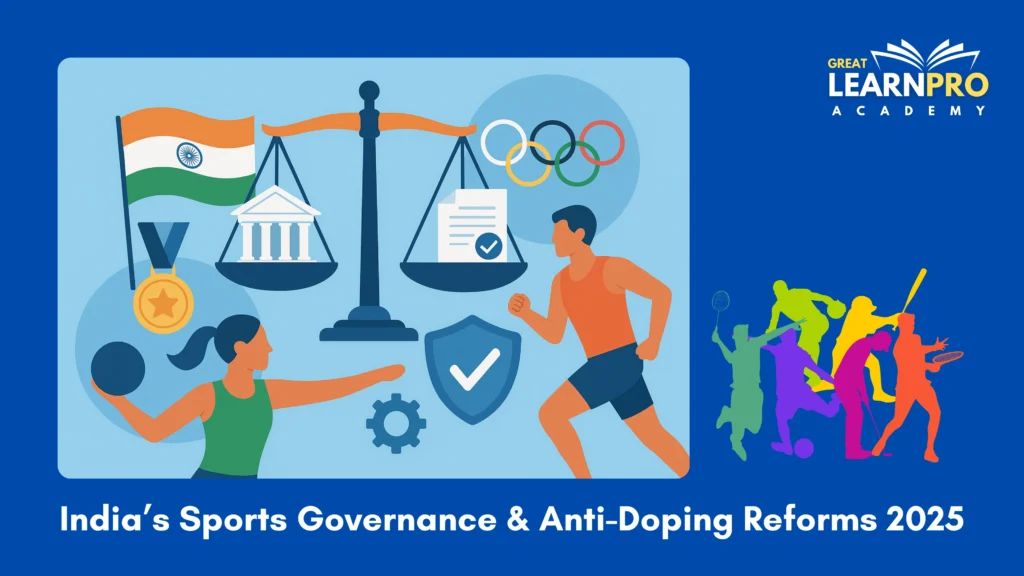
In a significant stride toward reforming Indian sports administration, Parliament passed two landmark legislative measures on August 11 and 12, 2025: the National Sports Governance Bill, 2025 and the National Anti-Doping (Amendment) Bill, 2025.
Establishing Robust, Transparent Governance
The National Sports Governance Bill now an Act after receiving the President’s assent on August 18, 2025 lays down a statutory structure aimed at aligning India’s sporting governance with international norms such as the Olympic and Paralympic Charters. Championed as the most transformational reform in decades, it heralds a new era of accountability, inclusion, and athlete-centric administration.
Key provisions include:
- National-Level Bodies & Boards: The law establishes a hierarchy comprising the National Olympic Committee, Paralympic Committee, sports-specific federations, and a powerful National Sports Board (NSB)—with the power to recognize, register, suspend, or cancel national and affiliate sports bodies.
- Ethical Norms & Inclusion: Each federation must adopt a Code of Ethics, a Safe Sports Policy (protecting women, minors, and differently-abled athletes), and a grievance redressal mechanism. Executive committees must include at least four women and two outstanding sportspersons—as well as athlete representatives—ensuring broad representation and athlete voices.
- Elections Oversight & Dispute Resolution: A National Sports Election Panel of experts will oversee transparent elections at national and affiliate levels. A National Sports Tribunal, headed by a retired Supreme Court or High Court judge, will adjudicate sports-related disputes swiftly and fairly.
- Limiting RTI for Non-Government Bodies: Right to Information (RTI) obligations are now limited to sports organizations that receive government funding—thus excluding independent entities like the BCCI if they don’t rely on such funding.
- More Inclusive Leadership Entry: To encourage fresh leadership, the Act reduces the eligibility requirement for top roles (President, Secretary General, Treasurer) to just one full term on the Executive Committee, instead of the earlier two-term prerequisite.
- Timeline & Background: Introduced on July 23, 2025, the Bill passed the Lok Sabha on August 11 and the Rajya Sabha on August 12. It aims to replace ad hoc structures from the 2011 code and pave the way for India’s 2036 Olympic aspirations.
Aligning India’s Anti-Doping Regime with Global Standards
Parallel to governance reform, the National Anti-Doping (Amendment) Bill, 2025, passed by Parliament on August 12, seeks to fortify India’s anti-doping framework in line with WADA and UNESCO norms.
Notable reforms include:
- Enhanced Autonomy for NADA: The National Anti-Doping Agency now enjoys operational independence from federations, committees, or government interference bolstering impartiality and credibility.
- Centralized Appeals Oversight: Authority to constitute the appeals panel shifts from the National Board to the central government, unifying procedural control.
- Controlled CAS Access: Only specified bodies—WADA, IOC, IPC, international federations—can file appeals to the Court of Arbitration for Sport (CAS). Indian athletes at the international level can appeal directly to CAS in specific circumstances.
- WADA Code Integration: The amendments adopt WADA’s definitions and schedule of anti-doping rule violations into domestic law, standardizing India’s legal framework.
- No Financial Penalties, Independent Panels: Earlier concerns about government overreach have been addressed by limiting financial penalties and establishing independent panels to oversee sanctions and appeals—mitigating WADA’s objections from 2022.
Sporting Fraternity Reacts with Enthusiasm
The Indian sports community has welcomed these twin reforms as overdue, comprehensive, and strategic.
- Athletes’ Voices: Badminton star Lakshya Sen called it a “historic moment,” emphasizing fairness and welfare. Para-javelin ace Sumit Antil praised provisions like the Election Panel and Safe Sports Policy as enhancing transparency.
- Administrators & Experts: AIFF President Kalyan Chaubey commended the creation of the NSB and Sports Tribunal for resolving legacy litigations. Para-shuttler Sukant Kadam lauded the push for professional, unbiased administration. Paralympic champion Avani Lekhara highlighted protection and inclusivity for women and para-athletes.
- Ministerial View: Sports Minister Mansukh Mandaviya described the governance bill as the “single biggest reform in sports since Independence” and framed these as essential steps toward realizing India’s Olympic ambitions.
Conclusion
Together, the National Sports Governance Act, 2025 and the Anti-Doping Amendment Bill, 2025 mark a watershed moment for Indian sports. By embedding accountability, athlete safety, fair governance, and international regulatory alignment into law, these Acts address long-standing structural issues and inject a system poised for transparency, equity, and excellence. If implemented effectively, these reforms could significantly enhance India’s sporting ecosystem laying a stronger foundation for fair competition, robust administration, and the nation’s global sporting ambitions.
Sources:
- https://economictimes.indiatimes.com/news/sports/parliament-passes-national-sports-governance-bill-2025-and-national-anti-doping-amendment-bill-2025-setting-stage-for-indias-2036-olympic-dream/articleshow/123258740.cms
- https://economictimes.indiatimes.com/news/new-updates/national-anti-doping-bill-explained-in-10-points-from-key-amendments-to-significant-changes-in-new-bill-set-to-change-the-indian-sports/articleshow/123258619.cms
More Current Affairs: https://learnproacademy.in/updates/
